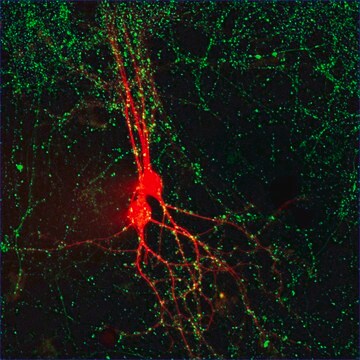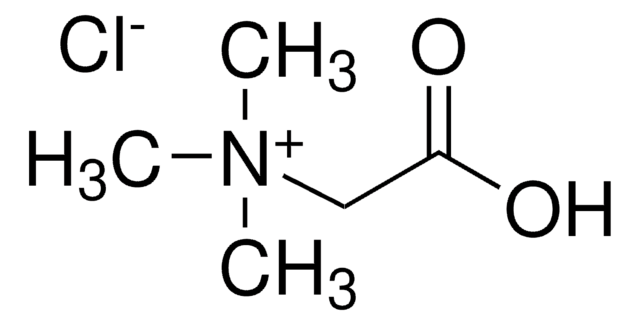SCP0036
Amyloid β 13-16 human
≥95% (HPLC)
Sinonimo/i:
HHQK
Autenticatiper visualizzare i prezzi riservati alla tua organizzazione & contrattuali
About This Item
Formula empirica (notazione di Hill):
C23H36N10O6
Peso molecolare:
548.60
Codice UNSPSC:
12352200
NACRES:
NA.32
Prodotti consigliati
Saggio
≥95% (HPLC)
Stato
lyophilized
Composizione
Peptide Content, ≥45%
Condizioni di stoccaggio
protect from light
Temperatura di conservazione
−20°C
Categorie correlate
Amino Acid Sequence
His-His-Gln-Lys
Applicazioni
Amyloid β (Aβ) refers to peptides derived from Amyloid precursor protein that vary in length from 36-43 amino acids. Aβ(s) peptides, their peptide fragments and mutated fragments are used to study a wide range of metabolic and regulatory functions including activation of kinases, regulation of cholesterol transport, function as a transcription factor, and regulators of inflammation. Aβ(s) peptides and their peptide fragments are also used to study oxidative stress, metal binding and mechanisms of protein cross-linking in the context of diseases such as Alzheimer′s disease and neurodegeneration. HHQK is a studied as a unique target site for inhibition of amyloid fibril formation and proteoglycan binding.
Codice della classe di stoccaggio
11 - Combustible Solids
Punto d’infiammabilità (°F)
Not applicable
Punto d’infiammabilità (°C)
Not applicable
Scegli una delle versioni più recenti:
Certificati d'analisi (COA)
Lot/Batch Number
Non trovi la versione di tuo interesse?
Se hai bisogno di una versione specifica, puoi cercare il certificato tramite il numero di lotto.
Possiedi già questo prodotto?
I documenti relativi ai prodotti acquistati recentemente sono disponibili nell’Archivio dei documenti.
Toshio Ariga et al.
Journal of neuroscience research, 88(11), 2303-2315 (2010-07-14)
The extracellular accumulation of amyloid beta proteins (Abetas) in neuritic plaques is one of the hallmarks of Alzheimer's disease (AD). The binding of Abetas to extracellular membranes (ECMs) is a critical step in developing AD. Abetas bind to many biomolecules
J McLaurin et al.
European journal of biochemistry, 267(21), 6353-6361 (2000-10-13)
One of the major clinical features of Alzheimer's disease is the presence of extracellular amyloid plaques that are associated with glycosaminoglycan-containing proteoglycans. It has been proposed that proteoglycans and glycosaminoglycans facilitate amyloid fibril formation and/or stabilize these aggregates. Characterization of
D Giulian et al.
The Journal of biological chemistry, 273(45), 29719-29726 (1998-10-29)
The beta-amyloid peptide 1-42 (Abeta1-42), a major component of neuritic and core plaques found in Alzheimer's disease, activates microglia to kill neurons. Selective modifications of amino acids near the N terminus of Abeta showed that residues 13-16, the HHQK domain
Il team dei nostri ricercatori vanta grande esperienza in tutte le aree della ricerca quali Life Science, scienza dei materiali, sintesi chimica, cromatografia, discipline analitiche, ecc..
Contatta l'Assistenza Tecnica.![[Glu11]-Amyloid β 10-16 human ≥95% (HPLC)](/deepweb/assets/sigmaaldrich/product/images/253/004/4be4057f-fdb4-45f6-950a-d1b2774044c1/640/4be4057f-fdb4-45f6-950a-d1b2774044c1.jpg)


![[Ala28]-Amyloid β 25-35 ≥95% (HPLC)](/deepweb/assets/sigmaaldrich/product/images/306/938/dd9f7c72-cfca-4ea3-8e10-a7a2a7994639/640/dd9f7c72-cfca-4ea3-8e10-a7a2a7994639.jpg)





